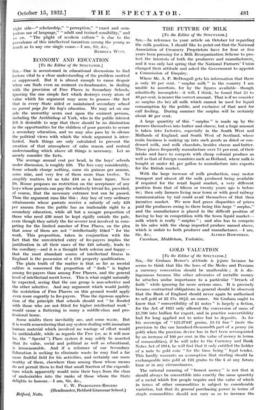THE FUTURE OF MILK [To the Editor of the SPECTATOR.]
SIR,—In reference to your article on October 1st regarding the milk position, I should like to point out that the National Association of Creamery Proprietors have for four or five years been pressing for a Milk Reorganization Scheme to pro- tect the interests of both the producers and manufacturers, and it was only last spring that the National Farmers' Union changed their attitude and asked the Government to appoint a Commission of Enquiry.
Where Mr. A. P. McDougall gets his information that there is only 10 per cent. " surplus milk " in the country I am unable to ascertain, for by the figures available—though admittedly incomplete—it will, I think, be found that 25 to 40 per cent, is nearer the correct amount. That is if we consider as surplus (to be) all milk which cannot be used for liquid consumption by the public, and exclusive of that used for calf feeding. During summer the surplus will be certainly about 40 per cent.
A large quantity of this " surplus " is made up by the farmers themselves into butter and cheese, but a huge amount is taken into factories, especially in the South West and Midlands of England, and South West of Scotland, -whose main business is making up into such goods as dried or con- densed milk, and milk chocolate, besides cheese and butter. These places frequently manufacture over 75 per cent, of their intake and have to compete with cheap colonial produce as well as that of foreign countries such as Holland, where milk is bought at under 4d. per gallon to manufacture into exports for the British market.
With the large increase of milk production, easy motor transport and almost all the milk produced being available if required for the retail liquid market, a very different position from that of fifteen or twenty years ago is before us ; then only farmers living near town or with good railway communication by rail could avail themselves of that then lucrative market. We now find grave disparities of prices paid the producers owing to there being this large " surplus," and the manufacturer is placed in the difficult position of having to buy in competition with the town liquid market— milk which is really " surplus " ; and also has to compete in his sales with the cheap imported produce named above, which is unfair to both producer and manufacturer.—I am;


























































 Previous page
Previous page